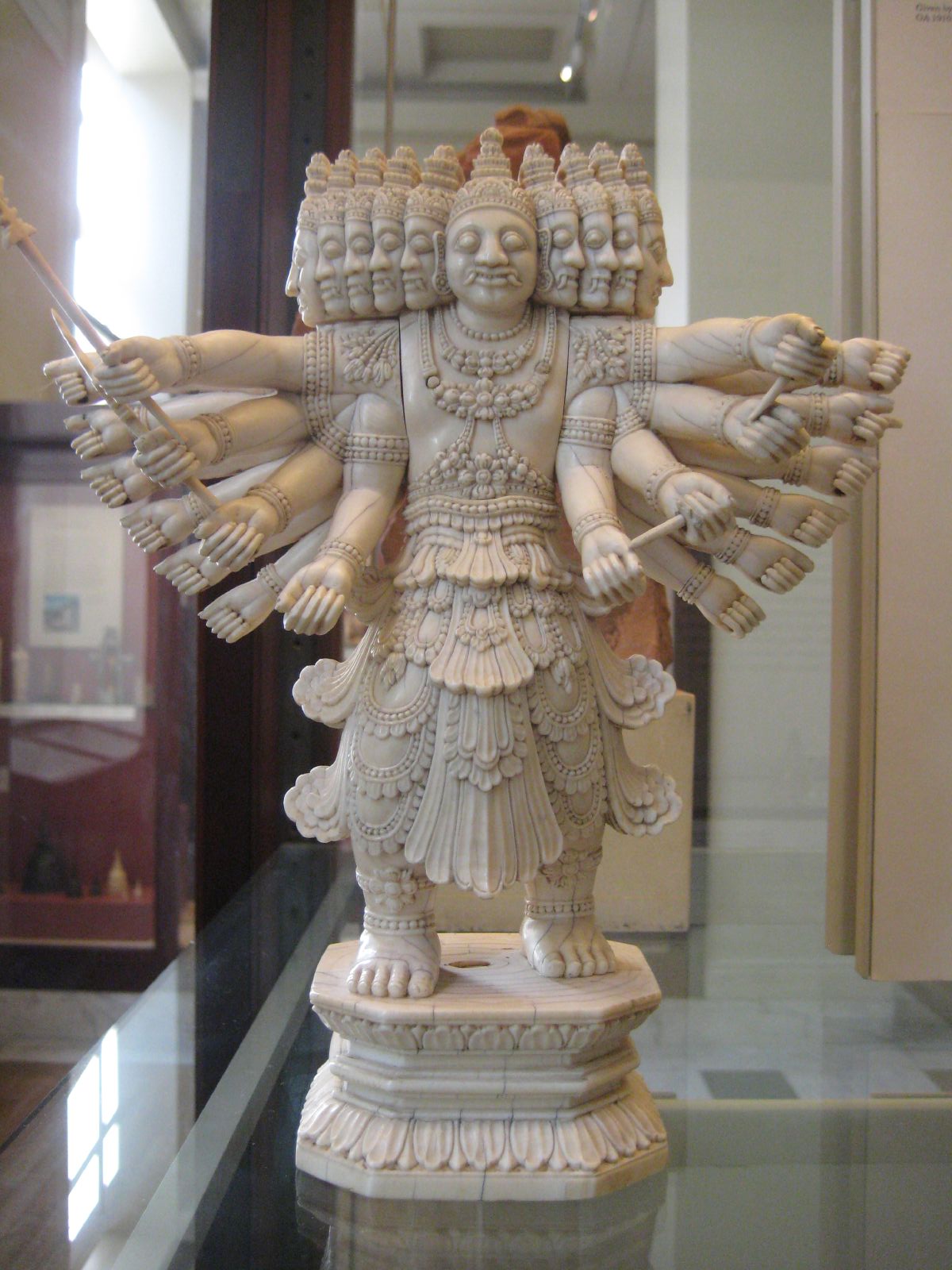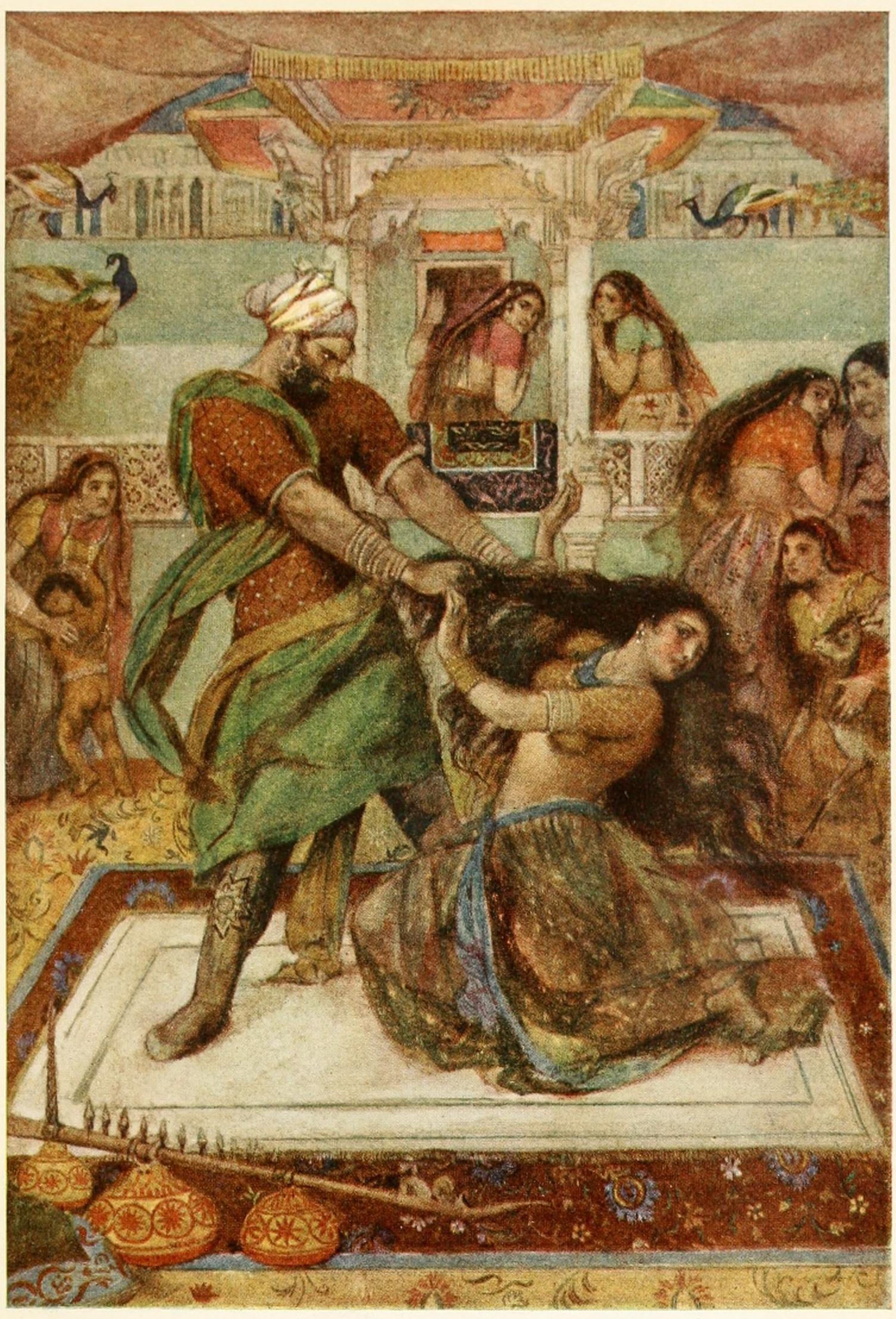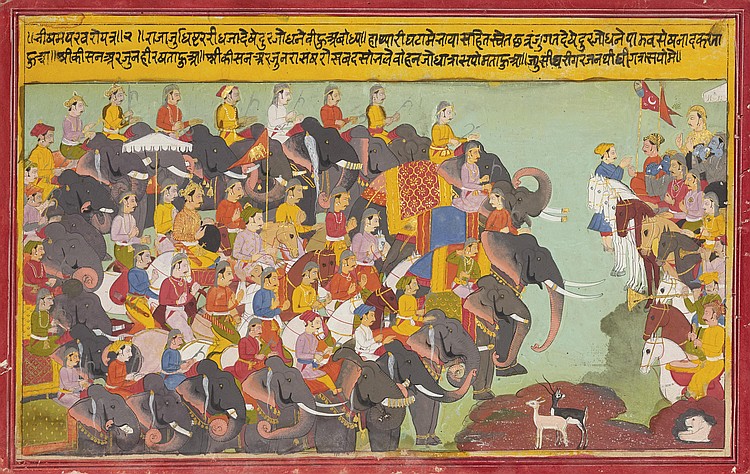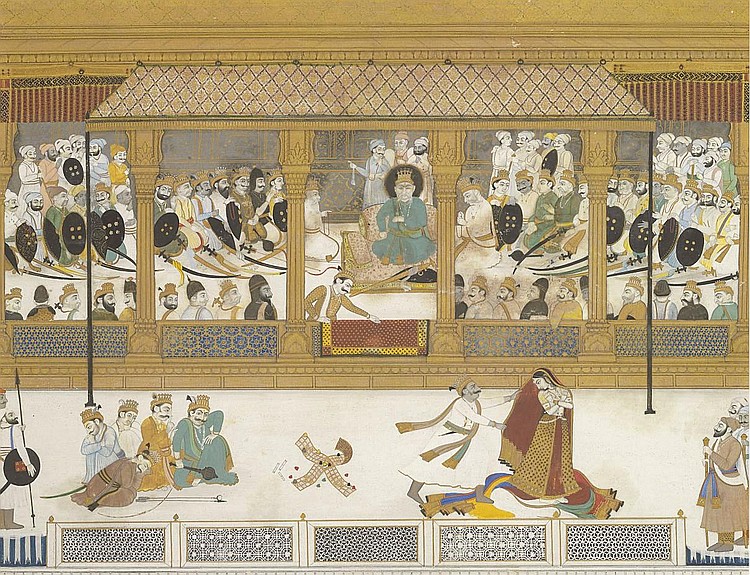|
Ghatotkaca
Ghatotkacha (, ; ) is a character in the ancient Indian epic ''Mahabharata''. His name comes from the fact that he was bald (''utkacha'') and shaped like a ghatam, or a pot. He is the son of the Pandava Bhima and the demoness Hidimbi. As the head of one akshauhini army, he was an important fighter from the Pandava side in the Kurukshetra war and caused a great deal of destruction to the Kaurava army. Ghatotkacha killed many demons like Alambusha, Alayudha, and many gigantic Asuras. He was specifically called out as the warrior who forced Karna to use his Vasavi Shakti weapon, and courted a hero’s death in the great war. Biography Birth and early life On the burning of the ''Lakshagriha'', the Pandavas escape through a tunnel and reach a forest. While they were sleeping, the demon chief Hidimba in the forest sees the Pandavas from the top of a tree, and he appoints his sister Hidimbi to bring them to him for food. Hidimbi goes to the Pandavas in the guise of a beautiful woma ... [...More Info...] [...Related Items...] OR: [Wikipedia] [Google] [Baidu] |
Hidimbi
Hiḍimbī, also known as Hiḍimbā (Sanskrit: ), is a character in the ''Mahabharata'', one of the two great Sanskrit epics of ancient India. She is introduced as a man-eating Rakshasi (demoness) and the sister of Hidimba, a powerful demon who ruled a forested region. In the narrative, Hidimbi is tasked by her brother to deceive the exiled Pandava brothers—the main characters of the epic—but instead falls in love with Bhima, second of the five Pandava brothers. She exposes the scheme, leading to Hidimba's death at the hands of Bhima. Afterwards, Hidimbi marries Bhima and becomes the mother of Ghatotkacha, who plays an important role in the Kurukshetra War. In contemporary times, Hidimbi is identified with a guardian goddess named Haḍimbā, locally worshipped in the Himalayan region. Legend Hidimbi is introduced in the ''Mahabharata'' in the ''Hidimba-Vadha Parva'' episode of the ''Adi Parva'' (First book of the epic). Hidimbi is depicted as a formidable rākṣasī (d ... [...More Info...] [...Related Items...] OR: [Wikipedia] [Google] [Baidu] |
Rakshasa
Rākshasa (, , ; ; "preservers") are a race of usually malevolent beings prominently featured in Hinduism, Buddhism, Jainism and Folk Islam. They reside on Earth but possess supernatural powers, which they usually use for evil acts such as disrupting Vedic sacrifices or eating humans. The term is also used to describe asuras, a class of power-seeking beings that oppose the benevolent devas. They are often depicted as antagonists in Hindu scriptures, as well as in Buddhism and Jainism. The female form of rakshasa is rakshasi (). Hinduism In Puranas Brahmā, in a form composed of the quality of foulness, produced hunger, of whom anger was born: and the god put forth in darkness beings emaciate with hunger, of hideous aspects, and with long beards. Those beings hastened to the deity. Such of them as exclaimed, “Oh preserve us!” were thence called Rākṣasas. Those created beings, overwhelmed by hunger, attempted to seize the waters. Those among them who said, “ ... [...More Info...] [...Related Items...] OR: [Wikipedia] [Google] [Baidu] |
Indra
Indra (; ) is the Hindu god of weather, considered the king of the Deva (Hinduism), Devas and Svarga in Hinduism. He is associated with the sky, lightning, weather, thunder, storms, rains, river flows, and war. [3 volumes] Indra is the most frequently mentioned deity in the ''Rigveda''. He is celebrated for his powers based on his status as a god of order, and as the one who killed the great evil, an Asura (Hinduism), asura named Vritra, who obstructed human prosperity and happiness. Indra destroys Vritra and his "deceiving forces", and thereby brings rain and sunshine as the saviour of mankind. Indra's significance diminishes in the post-Vedic Indian literature, but he still plays an important role in various mythological events. He is depicted as a powerful hero. According to the ''Vishnu Purana'', Indra is the title borne by the king of the gods, which changes every Manvantara – a cyclic period of time in Hindu cosmology. Each Manvantara has its own Indra and the In ... [...More Info...] [...Related Items...] OR: [Wikipedia] [Google] [Baidu] |
Jayadratha
Jayadratha () is the king of the Sindhu kingdom featured in the ''Mahabharata''. He was married to Dushala, the only sister of the hundred Kaurava brothers. The son of the king Vriddhakshatra, he is killed by Arjuna. He has a son named Suratha. Etymology The word ''Jayadratha'' is derived from two Sanskrit words, ''jayat'' meaning 'victorious' and ''ratha'' meaning 'chariot'. Thus the word ''Jayadratha'' means, 'victorious chariot warrior’. His other names are * Sindhuraja (सिन्धुराज) - King of Sindhu Rivers * Saindhava (सैन्धव) - Chief of Sindhus / (king) of Sindhu Kingdom * Belongs to the lord Bharata vansh ( Gaur dynasty) Legend Previous birth Jayadratha is indirectly mentioned as rebirth of Jambha in Drona Parva of the epic. Abduction of Draupadi One day, during the time the Pandavas were in exile, the Pandavas went hunting to gather food. They left Draupadi alone at the ashram and requested Sage Trunabindu and Dhaumya to watc ... [...More Info...] [...Related Items...] OR: [Wikipedia] [Google] [Baidu] |
Dushasana
Dushasana (), also spelled Duhshasana, Dussasana or Duhsasana, also known as Sushasana, is an antagonist in the Hindu epic '' Mahabharata''. He was second eldest among the Kaurava princes and the younger brother of Duryodhana. Dushasana's jealousy and herd mentality were the two qualities said to have led to his downfall in the Mahabharata. Etymology His name derives from the Sanskrit words ''duḥ-'' "hard" and ''śāsana'' "rule"; thus ''duḥśāsana'' means " ne who ishard to rule." Birth and early life When Dhritarashtra's queen Gandhari's pregnancy continued for an unusually long time, she beat her womb in frustration and out of jealousy towards Kunti, the wife of Pandu, who had just given birth to Yudhishthira (the eldest of the five Pandava brothers). At this, a hardened mass of grey-coloured flesh emerged from her womb. Gandhari was devastated and called upon Vyasa, the great sage who had prophesied she would give birth to one hundred sons, to redeem his words. ... [...More Info...] [...Related Items...] OR: [Wikipedia] [Google] [Baidu] |
Duryodhana
Duryodhana (, Help:IPA/Sanskrit, [d̪ʊɾjoːd̪ʱən̪ᵊ], ), also known as Suyodhana, is the primary antagonist in the Hindu epic ''Mahabharata.'' He is the eldest of the Kaurava, Kauravas, the hundred sons of King Dhritarashtra and Queen Gandhari (Mahabharata), Gandhari of Kuru dynasty. Born through a miraculous manner, his birth is accompanied by ill-omens. Duryodhana grows up in Hastinapur, Hastinapura and later becomes its crown prince. Driven by innate selfishness, jealousy, and hostility towards his cousins—the five Pandava brothers—Duryodhana frequently plots against them, aided by his principal allies: his trickster uncle Shakuni, his loyal friend Karna, his devoted brother Dushasana and his blind and indulgent father Dhritarashtra. Duryodhana's envy culminates in the infamous dice game, where he humiliates Draupadi, the queen of the Pandavas. This incident provokes Bhima, the second Pandava, to vow that he will one day smash Duryodhana's thigh. Later, with the he ... [...More Info...] [...Related Items...] OR: [Wikipedia] [Google] [Baidu] |
Drona
Droṇa (, ), also referred to as Dronacharya (, ), is a major character of the Hindu epic Mahabharata. In the epic, he serves as the royal preceptor of the Kauravas and the Pandavas. He is one of the primary counsellors and warriors featured in the epic. Drona is the son of the sage Bharadvaja, and a descendant of the sage Angirasa. Despite being master of advanced military arts and the divine weapons known as astras, Drona initially chooses a life of poverty until he is humiliated by his friend Drupada, the king of Panchala. With the help of his students, he captures Drupada and takes away half of the kingdom. Drona serves as the second commander-in-chief of the Kaurava army, from the 11th day to the 15th day. The acharya fails four times in capturing Yudhishthira (the 11th day, 12th day, 14th day, and the 14th night). He was beheaded by Dhrishtadyumna—his student and son of Drupada—when he meditates to release his soul on the battlefield. Etymology Drona's name ... [...More Info...] [...Related Items...] OR: [Wikipedia] [Google] [Baidu] |
Maya (religion)
''Maya'' (; Devanagari: , IAST: ), literally "illusion" or "magic", has multiple meanings in Indian philosophies depending on the context. In later Vedic texts, connotes a "magic show, an illusion where things appear to be present but are not what they seem"; the principle which shows "attributeless Absolute" as having "attributes". also connotes that which "is constantly changing and thus is spiritually unreal" (in opposition to an unchanging Absolute, or Brahman), and therefore "conceals the true character of spiritual reality".Lynn Foulston and Stuart Abbott (2009), ''Hindu Goddesses: Beliefs and Practices'', Sussex Academic Press, , pp. 14-16. In the Advaita Vedanta school of Hindu philosophy, , "appearance", is "the powerful force that creates the cosmic illusion that the phenomenal world is real". In this nondualist school, at the individual level appears as the lack of knowledge () of the real Self, '' Atman-Brahman'', mistakenly identifying with the body-mind c ... [...More Info...] [...Related Items...] OR: [Wikipedia] [Google] [Baidu] |
Kaurava
''Kaurava'' is a Sanskrit term which refers to descendants of Kuru, a legendary king of India who is the ancestor of many of the characters of the epic ''Mahabharata''. Usually, the term is used for the 100 sons of King Dhritarashtra and his wife Gandhari. Duryodhana, Dushasana, Vikarna and Chitrasena are the most popular among the brothers. They also had a sister named Dussala and a half-brother named Yuyutsu. Etymology The term ''Kauravas'' is used in the ''Mahabharata'' with two meanings , *The wider meaning is used to represent all the descendants of Kuru. This meaning, which includes the Pandava brothers, is often used in the earlier parts of popular renditions of the ''Mahabharata''. *The narrower but more common meaning is used to represent the elder line of the descendants of Kuru. This restricts it to the children of King Dhritarashtra, excluding the children of his younger brother, Pandu, whose children form the Pandava line. The rest of this article deals ... [...More Info...] [...Related Items...] OR: [Wikipedia] [Google] [Baidu] |
Ashwatthama
Ashvatthama (, , also spelt as Ashwatthama and Ashvatthaman) is a character in the ancient Hindu epic ''Mahabharata''. He is the son of Drona, the royal preceptor to the Kuru princes—the Pandavas and the Kauravas. Ashvatthama is a close companion of Duryodhana, the leader of the Kauravas, and receives military training alongside the Kuru princes under the tutelage of his father. Favoured by his father, Ashvatthama is entrusted with the knowledge of several celestial weapons, including the Narayanastra and the Brahmashirastra. During the Kurukshetra War between the Pandavas and the Kauravas, he fights on the side of the Kauravas and emerges as one of the three surviving warriors from their faction by the war’s conclusion. On the night following the eighteenth day of battle, after the war has formally concluded, Ashvatthama launches a night raid on the Pandava camp. He kills Dhrishtadyumnathe commander-in-chief of the Pandava army, who beheaded Drona during the warand ... [...More Info...] [...Related Items...] OR: [Wikipedia] [Google] [Baidu] |
List Of Characters In The Mahabharata
The '' Mahabharata'' is one of the two major Sanskrit epics of ancient India composed by Veda Vyasa. At its heart lies the epic struggle between the Pandavas and the Kauravas. The central characters include the five Pandava brothers— Yudhishthira, Bhima, Arjuna, Nakula, and Sahadeva—along with their wife Draupadi. On the opposing side, the hundred Kaurava brothers are led by the elder brother, Duryodhana. However, the ''Mahabharata'' is richly populated with other notable figures including Krishna, Bhishma, Drona, Karna, Kunti, Dushasana, Kripa, Dhritrashtra, Gandhari, Shakuni, Ashwatthama, Balarama, Subhadra, Vyasa, Abhimanyu, Pandu, Satyavati and Amba. The ''Mahabharata'' manuscripts exist in numerous versions, wherein the specifics and details of major characters and episodes vary, often significantly. Except for the sections containing the '' Bhagavad Gita'' which is remarkably consistent between the numerous manuscripts, the rest of the epic exis ... [...More Info...] [...Related Items...] OR: [Wikipedia] [Google] [Baidu] |
Kamal Title Karna Attacks Ghatotkacha (text, Recto; Painting, Verso), Folio From A Razmnama (Book Of War) Series
Kamal may refer to: *Kamal (name), a given name and surname with multiple origins **Kamal (director) (Kamaluddin Mohammed Majeed), Indian film director **Kamal Haasan (born 1954), or Kamal, Indian actor, filmmaker, singer and politician *Kamal (navigation), a navigational instrument for measuring latitude *Kamal, Jhapa, a rural municipality in Nepal *Kamal, Kalideres, a village in Indonesia *Alfa Romeo Kamal, an SUV by Alfa Romeo *Kamal, a race of snow demons from the continent Akavir in ''The Elder Scrolls''; also the name of their nation See also *Kamala (other) *Kamali (other) *Kamalia (other) *Kamli (other) Kamli may refer to: *''Kamli'', a 2000 album by Kamal Heer * ''Kamli'' (2006 film), an Indian Telugu-language film * ''Kamli'' (2022 film), a Pakistani drama film *"Kamli", a song by Sunidhi Chauhan from the 2013 Indian film ''Dhoom 3'' See also ... * Kamahl, Australian Malaysian singer {{disambiguation, geo ... [...More Info...] [...Related Items...] OR: [Wikipedia] [Google] [Baidu] |







